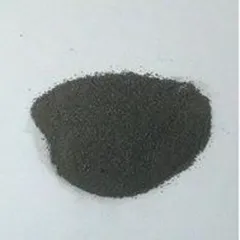- Home
- Products
- Elementary
- Boride Powder
- 3D Printing Powder
- Sulfide Powder
- Oxide Powder
- Carbide powder
- Nitride Powder
- Silicide Powder
- Hydride Powder
- Telluride Powder
- Selenide Powder
- Stearic Acid Series
- Phosphide Powder
- Nanoparticles
- Metal Alloy
- MAX Phase
- Lithium Battery Anode
- Surfactant
- Molecular sieves
- Concrete Admixtures
- Cladding of metals
- News
- Blog
- Contact
- About
High Purity Cobalt Co Powder CAS 7440-48-4, 99%
Description of 3D Printing Alloy Spherical Cobalt Powder:
Cobalt powder, also known as fine cobalt powder or ultra-fine cobalt powder, is a metal powder with unique physical and chemical properties. Its molecular formula is Co, which has a gray, irregular powder form. Among the physical properties of cobalt powder, the most significant is its magnetism. Cobalt is a ferromagnetic metal; its powder form also has this property. This magnetism makes cobalt powder important in manufacturing highly magnetic materials and magnetic recording media. The chemical properties of cobalt powder are also remarkable. It is an extremely reactive metal that reacts with many chemicals, including acids, bases, and some oxidants. When using cobalt powder, attention must be paid to its toxicity. Cobalt and its components can enter the body via the skin or digestive tract and through the respiratory tract and cause adverse health ef
fects. Therefore, relevant operating procedures and safety measures should be followed to avoid unnecessary contact and inhalation.

Features of 3D Printing Alloy Spherical Cobalt Powder:
Physical properties: spherical cobalt powder has a uniform spherical shape, smooth surface, and good particle dispersion. This unique form makes it show better fluidity and compressibility in applications.
Chemical properties: Spherical cobalt powder has good electrical conductivity, permeability, and thermal conductivity. These properties make it widely used in electronic, catalytic, and magnetic materials.
Overall performance: Compared with other forms of cobalt powder, spherical cobalt powder shows higher advantages in overall performance. For example, in 3D printing technology, spherical cobalt-chromium-molybdenum alloy powder is more suitable for producing higher-quality cobalt-chromium-molybdenum alloy parts because of its better surface finish and fluidity.
Advantages of 3D Printing Alloy Spherical Cobalt Powder:
Excellent physical properties: Spherical cobalt powder has a high degree of sphericity and a smooth surface, which gives it excellent fluidity, compressibility, and dispersion in many applications. These properties make spherical cobalt powder more advantageous in powder metallurgy, 3D printing, thermal spraying, and other fields.
Improve material properties: When spherical cobalt powder is used to prepare alloys or composite materials, the hardness, wear resistance, corrosion resistance, and electrical conductivity of the material can be significantly improved.
Easy processing and handling: Because the spherical cobalt powder has uniform particle size and good fluidity, it is more convenient in the processing and handling process.
Wide range of applications: spherical cobalt powder in energy, electronics, aerospace, automotive, and other fields has a wide range of applications. For example, it can manufacture high-performance batteries, magnetic materials, catalysts, etc.
Application of spherical cobalt powder:
With its unique physical and chemical properties, cobalt powder is extensively utilized in a myriad of fields. Some of the main application areas of cobalt powder are described in detail below.
Magnetic materials: Because cobalt is ferromagnetic, cobalt powder is often used to make magnetic materials. Cobalt powder is important in manufacturing high-magnetic materials and magnetic recording media. For example, alloying cobalt powder with other metals can create alloys with specific magnetic properties that can be used to make magnets, magnetic recording media, and so on.
Catalyst: Cobalt powder is a highly efficient catalyst used in many chemical reactions. For example, in the petroleum industry, cobalt catalysts produce high-octane gasoline. In the synthetic ammonia industry, cobalt catalysts are used to increase the yield of ammonia. In addition, cobalt powder can also be used in hydrogenation reactions, oxidation reactions, and many other chemical reactions.
Batteries: Cobalt powder also has important applications in battery manufacturing. For example, cobalt is used as part of the cathode material in lithium-ion batteries. Because cobalt can improve the energy density and stability of batteries, cobalt has an irreplaceable role in battery manufacturing. However, due to cobalt's high price and toxicity, its application in battery manufacturing is also limited to a certain extent.
Tungsten carbide: Cobalt powder also plays an important role in the manufacture of tungsten carbide. Cemented carbide is an alloy made of cobalt and carbide with high hardness, excellent wear resistance, and superior corrosion resistance properties. It is extensively used in production for cutting and measuring instruments, wear parts, etc. Cobalt powder must be mixed with other metal powders and sintered at high temperatures to manufacture cemented carbide.
Coatings and coatings: Cobalt powder can be used as an additive in coatings and coatings to improve their hardness and wear resistance. For example, when making cemented carbide cutting tools, a layer of cobalt powder can be coated on its surface to improve its service life. In the manufacture of decorative coatings, cobalt powder can be added to improve the coating's hardness, wear resistance, and corrosion resistance.
Aerospace field: Because cobalt has high density and good strength and toughness, cobalt powder also has important applications in the aerospace field. For example, cobalt powder can manufacture aircraft engine parts and spacecraft structural parts. Because cobalt has good processing and high-temperature properties, it is also one of the important aviation materials.
Functional materials: Cobalt powder can also be used as functional materials, such as thermoelectric materials, magneto-optical materials, superconducting materials, etc. For example, in thermoelectric materials, adding cobalt can improve the material's thermoelectric properties. In magneto-optical materials, adding cobalt can change the optical properties of the materials. The superconducting properties of superconducting materials can be improved by adding cobalt.
Cobalt Powder Specification:
Products | Purity | APS | Sky is you | Bulk Density | Morphology | SSA |
Cobalt nanoparticle | 99.5% | 20-80nm | Black | 1.3g/cm3 | Sphere | 40-60m2/g |

Company Profile:
Synthetic Chemical is a trusted global chemical material supplier & manufacturer with over 12 years of experience providing super high-quality chemicals and nanomaterials, including boride powder, nitride powder, graphite powder, sulfide powder, 3D printing powder, etc.
The company has a professional technical department and Quality Supervision Department, a well-equipped laboratory with advanced testing equipment, and an after-sales customer service center.
If you are looking for high-quality spherical cobalt powder , please feel free to contact us or click on the needed products to send an inquiry.
Payment Term:
L/C, T/T, Western Union, Paypal, Credit Card etc.
Shipment Term:
By sea, by air, by express, as customers request.

Storage Conditions:
1) Store in a dry environment at room temperature.
2) Avoid damp and high temperatures.
3) Use immediately after opening the inner packing bag.
FAQ:
Q1:
What is the chemical property of cobalt powder?
Reactivity: At room temperature, cobalt powder is stable in air and water. However, when the temperature reaches more than 300 ° C, the cobalt powder will oxidize, and the very fine cobalt powder will automatically burn at room temperature.
Solubility: Cobalt can be dissolved in dilute acids, such as sulfuric, hydrochloric, and nitric acid, to form a bivalent cobalt salt. However, in concentrated nitric acid, the cobalt metal will form an oxide film and be passivated.
Magnetism: Cobalt powder is ferromagnetic, which can be magnetized in a magnetic field. The Curie point of cobalt (the temperature at which magnetism disappears) is very high, reaching 1121 ° C.
Oxides: Cobalt oxides include CoO, Co3O4 and Co2O3. CoO and Co3O4 are stable oxides, while Co2O3 can only exist at temperatures below 300 ° C.
Q2:
In what fields is cobalt powder widely used?
Superalloy: Cobalt powder, as an important part of superalloy, can improve the strength, hardness, and heat resistance of the alloy.
Magnetic materials: Cobalt powder has good magnetic properties and can manufacture magnetic materials, such as magnetic recording materials and sensors. Cobalt powder can also prepare high-performance permanent magnet materials, such as cobalt magnets, widely used in motors, generators, magnetic drives, and other fields.
Catalyst: Cobalt powder, as a catalyst, has excellent catalytic activity and selectivity. It can be used for catalytic reactions in organic synthesis, petrochemicals, environmental protection, and other fields, such as hydrogenation reactions, oxidation reactions, hydrocracking, and so on.
Q3:
Which area uses the most cobalt powder?
The battery sector is one of the areas where cobalt powder is used the most. In particular, with the rapid growth of the electric vehicle market, the demand for high-performance batteries is also increasing, so the amount of cobalt powder used in lithium-ion batteries is rising yearly.
In addition to the battery field, high-temperature alloys, magnetic materials, catalysts, and biomedical materials are important application areas of cobalt powder.
Q4:
What are the properties of cobalt powder?
Cobalt powder has good resistance to light, heat, and chemical corrosion. This means that cobalt powder does not easily fade under sunlight, nor will it be deformed by heat to maintain its gorgeous color for a long time. Therefore, cobalt powder is suitable for indoor and outdoor decoration, painting, and other purposes.
Cobalt powder has good magnetic properties. Due to the high permeability of cobalt, cobalt powder can be used to manufacture magnetic materials and products, such as permanent magnets, magnetic recording materials, magnetic sensors, etc. In addition, cobalt powder can also be used to manufacture magnetic alloys, which play an important role in the modern electronics and electromechanical industry, to manufacture various components of acoustic, optical, electrical, and magnetic devices.
Cobalt powder also has certain antibacterial properties. Studies have shown that cobalt ions can inhibit the growth and reproduction of common bacteria to play a certain antibacterial role. This makes the application of cobalt powder in medical devices, pharmaceutical products, and other fields gradually increase, and it can be used as a coating additive, increases the antibacterial performance of products, and protects people's health and safety.
Q5:
Is the higher the purity of cobalt powder, the stronger the magnetism?
Yes. The purity of cobalt powder is closely related to its magnetism. Generally, the higher the purity of cobalt powder, the stronger its magnetic properties. This is because the impurity content of high-purity cobalt powder is low, which can better reflect the magnetic properties of cobalt itself.
High-purity cobalt powder is the preferred raw material in manufacturing magnetic materials. By controlling parameters such as purity and particle size of cobalt powder, the properties of magnetic materials, such as permeability and coercivity, can be adjusted. Therefore, high-purity cobalt powder is essential for manufacturing high-performance magnetic materials.
Cobalt Powder Properties | |
| Lesser Titles | cobalt nanopowder, cobalt nano-particles, cobalt nano-powder, nanocobalt, nano-cobalt |
| 7440-48-4 | |
| Content format | Co |
| Modility | 58.93 |
| Appearance | Black powder or gray powder |
| Melting Point | 1495 |
| Boiling Point | 2870 |
| Poisson Rate | 0.31 |
| Solubility | N/A |
| Thermal Expansion | (25 degC) 13.0 um*m-1*K-1 |
Safety & Health Information | |
| Danger | |
| Hazard Statements | H228-H317-H334-H351 |
| Hazard Codes | Xn |
| Risk Codes | 42/43-53 |
| Privacy statement | 22-24-37-61 |
| Transport Information | UN 3089 4.1/PG2 |
Inquiry us
PREVIOUS Elementary
High Purity Spherical Graphite C Powder CAS 7782-42-5, 99.9%
NEXT Elementary